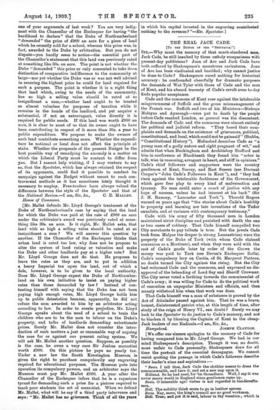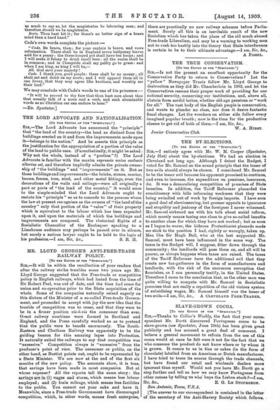THE REAL JACK CADE.
[To THE EDITOII 01 THE " SPECTATOR.."] SIR,—Why must the memory of that much-slandered man, Jack Cade, be still insulted by these unholy comparisons with present-day politicians ? Joan of Arc and Jack Cade have both suffered by Shakespeare's monstrous caricatures. Joan of Arc has been vindicated and beatified; why cannot justice be done to (Jade? Shakespeare cared nothing for historical accuracy : he confounded cheerfully for dramatic purposes the demands of Wat Tyler with those of Cade and the men of Kent, and his absurd travesty of Cade's revolt even to-day finds popular acceptance.
Cade and the commons of Kent rose against the intolerable misgovernment of Suffolk and the gross mismanagement of the French war. Suffolk and two of his Ministers—Bishops Moleyns and Ayscough—were put to death by the people before Cade reached London, so general was the discontent. The demands of Cade and the commons were almost entirely for political and judicial reform. "They based their com- plaints and demands on the existence of grievances, political, constitutional, and local, which could not be gainsaid" (Stubbs, "Constitutional History "). Holinshed describes Cade as "a young man of a godly nature and right pregnant of wit," and admits that when Buckingham and Archbishop Stafford met him in conference at Blackheath they found him "sober in talk, wise in reasoning, arrogant in heart, and stiff in opinions." Cade's chief followers and supporters were the country gentlemen of Kent, Surrey, and East Sussex (see Durrant Cooper's "John Cade's Followers in Kent "), and "they had risen against the intolerable feebleness of the Government, which gave free play to every kind of malversation and tyranny. No man could enter a court of justice with any hope of success, unless he had interest at his back" (Sir J. H. Ramsey, "Lancaster and York "). Thorold Rogers warned us years ago that " the stories about Cade's hostility to property and learning are late inventions of the Tudor annalists, and at variance with contemporary testimony."
Cade with his army of fifty thousand men in London maintained strict discipline and punished with death the one or two cases of robbery. That Cade himself compelled two City merchants to pay tribute is true. But the jewels Cade took from Malpas the draper (a strong Lancastrian) were the property of the Duke of York (with whom Cade claimed connexion as a Mortimer), and when they were sold with the rest of Cade's goods later by order of the Crown the money was paid to York (see Devon's Exchequer Rolls). Cade's compulsory levy on Curtis, of St. Margaret Pattens, no doubt turned the City against the rising. But the City had welcomed Cade and the commons, and expressed no dis- approval of the beheading of Lord Say and Sheriff Crowmer. The City never voted a farthing towards the commissariat of Cade's army ; it was willing for Cade to do the political work of execution on unpopular Ministers and officials, and then meanly withstood him when that work was done.
That Cade himself was a man of substance is proved by the Act of Attainder passed against him. That he was a brave, honest, disinterested patriot who, at this length of time, after study of the reign of Henry VI., can doubt? Surely we may look to the Spectator to do justice to Cade's memory, and not to blacken it by likening the Captain of Kent to the cheap- Jack leaders of our Radicals.—I am, Sir, &a.,
[We offer our sincere apologies to the memory of Cade for having compared him to Mr. Lloyd George. We had in our mind Shakespeare's description. Though it was, no doubt, most unfair to Cade personally, Shakespeare drew for all time the portrait of the essential demagogue. We cannot resist quoting the passage in which Cade's followers describe their leader's aims and aspirations :—
"Bevis. I tell thee, Jack Cade the clothier means to dress the commonwealth, and turn it, and set a new nap upon it.
Holland. So he had need, for 'tis threadbare. Well, I say it was never merry world in England since gentlemen came up.
Bevis. 0 miserable age! virtue is not regarded in handicrafts- men.
Hal. The nobility think scorn to go in leather aprons.
Bevis. Nay, more, the king's council are no good workmen. Hell. True; and yet it is said, labour in thy vocation ; which is as much to say as, let the magistrates be labouring men; and therefore should we be magistrates. Bevis. Thou }last hit it ; for there's no better sign of a brave mind than a hard hand."
Cade's own words complete the picture :—
" Cade. Be brave, then ; for your captain is brave, and vows reformation. There shall be in England seven halfpenny loaves sold for a penny: the three-hooped pot shall have ten hoops ; and I will make it felony to drink small beer: all the realm shall be in common ; and in Cheapsido shall my palfry go to grass : and when I am king, as king I will be,— AU. God save your majesty !
Cade. I thank you, good people: there shall be no money ; all shall eat and drink on my score ; and I will apparel them all in one livery, that they may agree like brothers, and worship me their lord."
We may conclude with Cade's words to one of his prisoners :- "It will be proved to thy face that thou bast men about thee that usually talk of a noun and a verb, and such abominable words as no Christian car can endure to hear."
—ED. Spectator.]







































 Previous page
Previous page